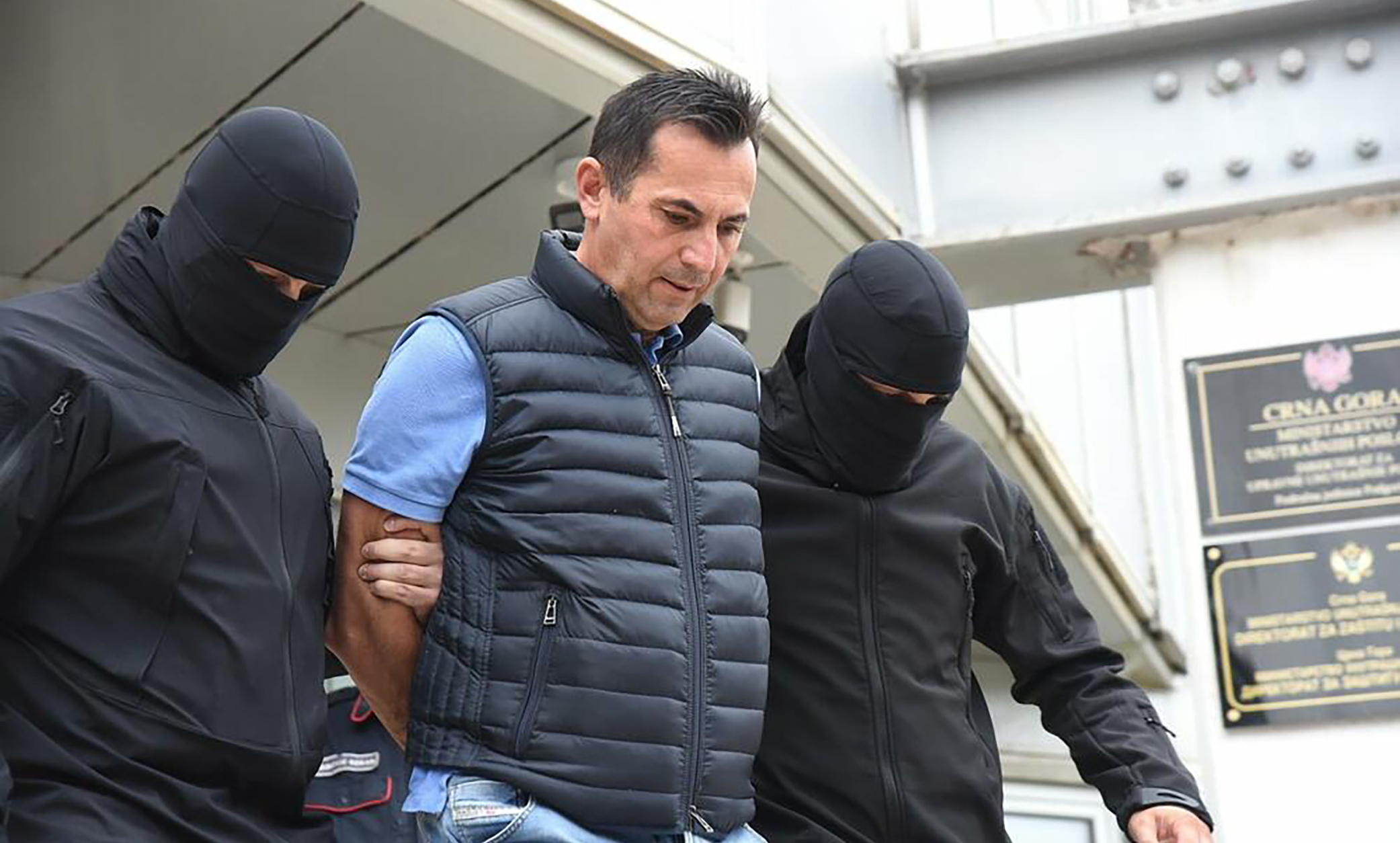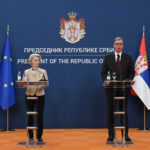*In its basic meaning, the term “bifurcation point” refers to a critical moment in the development of a given system when a small change can lead to entirely different outcomes. The term originates from chaos theory and nonlinear dynamic systems, but it can also be applied to social processes.
The President of the European Commission, Ursula von der Leyen, during her visit to Montenegro on October 14, called Podgorica’s plan to close all chapters in negotiations with the EU next year and become the 28th EU member state by 2028 an ambitious, but achievable goal. According to her, Montenegro can achieve the set goals “if it remains focused on the objective and united.”
But will the Montenegrin authorities manage to fulfill this roadmap set by the head of the European Commission?
The wave of high-profile arrests in Montenegro that took place in early October 2025 is a symptom of a significant escalation of the political situation in the country. Behind bars are not only the well-known businessman Aleksandar Mijajlović, who is linked to the former ruling, and now opposition, Democratic Party of Socialists (DPS), but also former high-ranking officials, including ex-Minister of Defense and DPS functionary Predrag Bošković.
This case is of particular importance in the context of the geopolitical confrontation in the Western Balkans and may have significant consequences not only for the country but for the entire region.
History of (Geo)Political Confrontation
The fierce confrontation between pro-Western political forces and structures that are more oriented toward Belgrade, and in some cases directly toward Moscow, has been ongoing in Montenegro since the mid-2010s, when the country under the leadership of Milo Đukanović and the DPS took a clear course toward Euro-Atlantic integration. Montenegro successfully joined NATO in June 2017, which was preceded by very turbulent events — above all, the attempted coup d’état in 2016. According to the investigation and the verdict of the first-instance court, which was later annulled, the conspiracy was allegedly led by Russian agents, while Serbian citizens (including a retired commander of the Serbian Gendarmerie) and pro-Serbian and pro-Russian politicians from Montenegro participated in the attempt to violently overthrow the government. The goal of the coup, as stated in court, was to prevent the country’s accession to NATO. However, the putsch, as well as the attempt to stop Montenegro’s Euro-Atlantic integration, ended in failure.
At the end of the 2010s, the political confrontation in Montenegro entered a new phase. In 2019, the dispute surrounding the Serbian Orthodox Church (SOC) led to renewed escalation. In response to the adoption of the Law on Freedom of Religion, which provided for the return of monasteries and churches used by the SOC to state ownership, a broad movement of resistance developed in the country. Massive protest actions involving believers — litije (religious processions) — managed to unite a wide social and political front against the authorities. The confrontation culminated in the defeat of the DPS in the parliamentary elections on August 30, 2020. The success of the DPS’s opponents was reinforced by the subsequent parliamentary and presidential elections held in 2023.
The departure from power of the Democratic Party of Socialists, led for a long time by former president and ex-prime minister Milo Đukanović, was interpreted by many in Montenegro and beyond, including in the West, as a victory of new politicians over an old, corrupt, and authoritarian regime. However, at the same time, one cannot overlook the fact that, instead of the DPS — a pro-Western political force that was considered insufficiently democratic and accused of corruption — new pro-European politicians came to power alongside political actors long oriented toward Belgrade (and personally toward Serbian President Aleksandar Vučić), and in some cases even toward Moscow (and Vladimir Putin). It is enough to note that the current President of the Parliament of Montenegro is Andrija Mandić, the former leader of the pro-Russian Democratic Front and a defendant in the “Coup d’État” case.
Although, thanks to coalition agreements and Western pressure, there was no sharp change in Montenegro’s geopolitical course after 2020 — membership in NATO and the path toward European integration were preserved — certain changes in foreign policy and the overall geopolitical narrative are nevertheless evident.
A striking example may be the “Coup d’État” case. After the change of government in 2020, the first-instance verdict that had handed down a guilty judgment was annulled by the Court of Appeals in 2021. The case was later sent for retrial. However, there is still no final court decision; the process has not been concluded, and those accused have de facto been fully freed from responsibility.
In foreign policy, there was a sharp deterioration in relations with neighboring Croatia, primarily due to the adoption of the Declaration on Jasenovac in the Montenegrin Parliament. The vote in Podgorica took place shortly after the adoption of the Resolution on the Srebrenica Genocide in the UN General Assembly, which Belgrade strongly protested. Therefore, everyone in the region understood that this move by the Montenegrin ruling coalition was a kind of “gesture of Serbian solidarity”. This is understood in Zagreb as well. As a result, Croatia’s foreign policy narrative toward Montenegro changed. Although Podgorica formally retained Zagreb’s support on its path to the EU, in practice, the Croatians effectively blocked the opening of the next cluster in the negotiations between Montenegro and the European Union at the end of last year and presented a long list of conditions for its unblocking. Given that almost all the points on this list concern bilateral problems that arose during or as a result of the war — that is, they are not new — it is obvious that the new Croatian policy toward Montenegro is directly linked to the actions of the Montenegrin authorities in recent years. Thus, one cannot ignore the connection between the arrival of “Serbian World” apologists in the ruling coalition in Podgorica and the deterioration of relations with Zagreb, and, consequently, the slowing of the European integration process, even though, on paper, all Montenegrin authorities allegedly support EU accession.
The Mijajlović Case
The scandalous events unfolding in Montenegro’s political life today are continuation of the political landscape shifts that began in 2020 and may also affect the country’s European integration process.
In early October 2025, several prominent and influential individuals were arrested in Montenegro. Among them were businessman Aleksandar Mijajlović, described by the media as the “informal co-owner” of “Bemax” — the largest construction company in Montenegro — several former and current high-ranking officials of the police, security services, and the prosecution, and former Minister of Defense and now opposition Democratic Party of Socialists (DPS) functionary Predrag Bošković.
The Special State Prosecutor’s Office (SDT) of Montenegro suspects them of creating a criminal organization that operated from 2018 to 2024, allegedly led by Mijajlović. The suspects are accused of abuse of office and of disclosing confidential information for the purpose of obtaining illegal gain and power, the Prosecutor’s Office reported. “Each member had a pre-defined task and role,” and there was “readiness to use violence and intimidation”. The prosecution also claims that there was an “influence of the criminal organization” on the government and the media.
Podgorica’s Vijesti reports that Mijajlović had access to data from secret surveillance, the content of intercepted communications, and allegedly also intelligence data and recordings of the National Security Agency (ANB) of Montenegro. Meanwhile, the prosecution claims that between 2018 and 2024, Mijajlović influenced the editorial policies of Standard, Pobjeda, CDM, Portal Analitika, Antena M, Mportal, and Portal ETV (i.e., media outlets that take a clearly pro-Western position and criticize the current Montenegrin government).
Interestingly, the disclosed correspondence presented by the prosecution includes communication between Mijajlović and former Vijesti journalist Olivera Lakić, who was attacked by criminal groups in 2018 because of her journalistic work and who is a recipient of the prestigious International Women of Courage Award, presented to her by then U.S. Secretary of State Mike Pompeo. Although, as a former journalist of a media outlet that now openly supports the Prosecutor’s Office’s action, she does not fit into the narrative of the alleged “media network” coordinated by Mijajlović, she has nevertheless become a target of prosecutorial structures. Her investigative portal Libertas Press has recently published articles about the renewed relevance of the “Coup d’État” case, which in no way aligns with the interests of the new authorities.
According to the prosecution, the classified information Mijajlović obtained from other defendants was used to “shape public opinion in order to suppress competition, for the personal and professional discrediting of individuals, religious and political organizations, and business structures”. Specifically, the prosecution suspects that the assistant to the former police chief, also a defendant in the case, provided Mijajlović with information about the participants and the exact number of people present at litije organized by the SOC at the end of 2019 and during 2020 in connection with the adoption of the Law on Freedom of Religion. Among the intercepted communications included in the case materials is an exchange of messages between Mijajlović and Bošković regarding the health condition of the now deceased Metropolitan of Montenegro and the Littoral of the SOC, Amfilohije, while he was being treated at a medical center in Podgorica.
In a separate proceeding, Mijajlović is suspected of leading a criminal organization that engaged in cigarette smuggling from the Port of Bar between 2019 and 2021.
Reactions from Media and Politicians
The Council for Media Self-Regulation (CMS), the body overseeing the work of most Montenegrin media, condemned the dangerous attempts to criminalize journalistic work.
Dušan Pajović, a columnist for CDM, claims that the idea of this approach is to equate any oppositional or critical word with criminal activity.
Editors of M portal, Standard, Pobjeda, CDM, Portal ETV, Analitika, and Antena M categorically rejected the prosecution’s accusations, calling them an attack on media freedom and urging Johan Sattler, the EU Ambassador to Montenegro, to react to “gross and unprecedented abuse of power aimed at silencing any critical voice”.
The Democratic Party of Socialists, commenting on the latest events, called the Special State Prosecutor’s Office “a whip of the current government for fighting political dissidents”. “The Special State Prosecutor’s Office, headed by Vladimir Novović, acts according to a list of priorities presented to it by the current government, whose rating is constantly falling, and therefore it sees its only salvation in the shameless defamation of political opponents,” said the DPS. According to the party, “Montenegro is entering a phase of open dictatorship”.
Representatives of the authorities assert that the goal of the judiciary’s actions is the fight against crime, in which the state will prevail.
Following the arrest of several high-ranking officials, Deputy Prime Minister for Security, Defense, the Fight against Crime, and Internal Policy, Coordinator of the Bureau for Operational Coordination of the Intelligence and Security Sector, and leader of Democratic Montenegro, Aleksa Bečić, congratulated the Chief Special Prosecutor, the Director of the Police Directorate, and the Head of the Special Police Department and their teams on historic steps in the fight “against all forms of crime”. In a post on X, he wrote that, on the one hand, there is a “decisive fight against crime, verification, and uncovering of dark topics from the past,” while on the other — “noise, hysteria, infamy, attacks, and, in essence, fear and panic”. “The state will not stop. The state will go to the end. The state will prevail,” emphasized Bečić.
Possible Consequences
According to the authorities, the result of the current activity of the judiciary should be the destruction of old criminal clans closely connected with the DPS, which, despite being in opposition, still had significant influence on the socio-political life of the country. Successful combat against crime and corruption — as is evidently expected — should become an important argument in negotiations with the EU.
Another outcome — which is not publicly discussed in government offices — will be the discrediting and final elimination of the remnants of influence of the Democratic Party of Socialists. This would mean that the opposition would be left without a powerful player with the strength and motivation to change the government. This is precisely what the DPS means when it states that the country is approaching dictatorship.
At the same time, the authorities disregard another consequence — the restriction of freedom of speech. The simultaneous discrediting of a number of influential opposition media outlets and journalists looks like a deliberate attempt to create problems for independent media precisely because of their position.
If success in the fight against corruption and crime will be a plus on the way to the EU, then pressure on journalists by the authorities and the shrinking of democracy in political life will bring Montenegro serious problems. Of course, official Podgorica will try to convince Brussels that it is exclusively a matter of prosecuting criminals, without any political component. The further development of the situation will show whether these expectations will be justified or whether the latest events in Montenegro’s political life will contribute to the country’s European integration — or, on the contrary, slow it down.
However, the main outcome of the current actions of the Montenegrin authorities will have different consequences.
Whatever the open cases ultimately lead to, it is clear that we are witnessing the final stage of Montenegro’s political transformation that began in 2020. Instead of the Democratic Party of Socialists — a party with a bad reputation and a burdened past, but with consistently pro-Western policies — power in Podgorica is being consolidated seriously and long-term by a coalition consisting, on the one hand, of new, moderately pro-Serbian and nominally pro-Western forces, and on the other — experienced and powerful pro-Serbian and pro-Russian political structures. Whether Montenegro with such a government can achieve EU membership in three years and whether it can preserve its Euro-Atlantic course, especially if Belgrade and Moscow oppose it — is a rhetorical question.
CWBS Analytical Group



